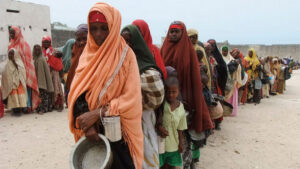New research points to major challenges if we fail to slow down global warming. Sweden’s vision to become the first fossil-free welfare state is not enough. We also need to reduce the emissions that Swedish consumption causes outside our borders.

As a result of drought, a famine disaster is currently taking place in Africa, with its center in Somalia and South Sudan. Photo: Farah Abdi Warsameh AP.
The EU Commission funds three research projects that study the consequences of high-end climate change. In the recently published report “High-End Climate Change in Europe: Impacts, Vulnerability and Adaptation”, three years of research by more than 150 researchers is summarised. The impacts of high-end climate change can lead to major socio-economic challenges.
The world has managed to stabilize the emissions of carbon dioxide. For the third consecutive year, we are not releasing more carbon dioxide into the atmosphere than the previous year. But we need to quickly reduce emissions to have a reasonable chance of reaching the Paris agreement’s target of a temperature increase “well below” 2 degrees Celsius by 2100. If we continue on the current path, temperatures will rise above 2 degrees, with potential increases of 6 degrees or more.
High-end climate change affect a range of areas and sectors of society:
How severe the impacts of climate change will be depends on two factors:
The major impacts of climate change will hit future societies, not today’s society. As an example consider Nigeria’s future food supply. The average temperatures in Nigeria could increase 3 degrees until 2050, implying major consequences for the country’s agriculture. During that same period, Nigeria’s population is expected to increase from 180 million to as much as 400 million. It is this double-faceted challenge that the world face.
A future with high-end climate change is unfortunately quite possible. We must attempt to avoid it at all costs, but at the same time plan for the worst-case scenario. Either we do it now, when we have the financial resources, institutional capacity and time to act, or we put it off and become forced to manage the urgent consequences of climate change.
The new climate policy framework recently passed by the Swedish Parliament is a good start. But even if all countries follow Sweden’s model, these ambitions are not enough. Sweden’s vision of becoming the world’s first fossil-free welfare state does not account for the fact that we live in a globalized world. Sweden should instead, as the first high-income country, develop a vision which helps avoid high-end climate change by setting targets and measures for emission reductions derived from Swedish consumption of imported goods.
Sweden should take a global responsibility. As researchers, we deal with climate change as a global issue every day and we urge the Government to do the same. Anything else would be irresponsible.
This Op-Ed originally appeared in Dagens Nyheter on 14 July 2017 and was translated by Anneli Sundin (SEI).
Design and development by Soapbox.


